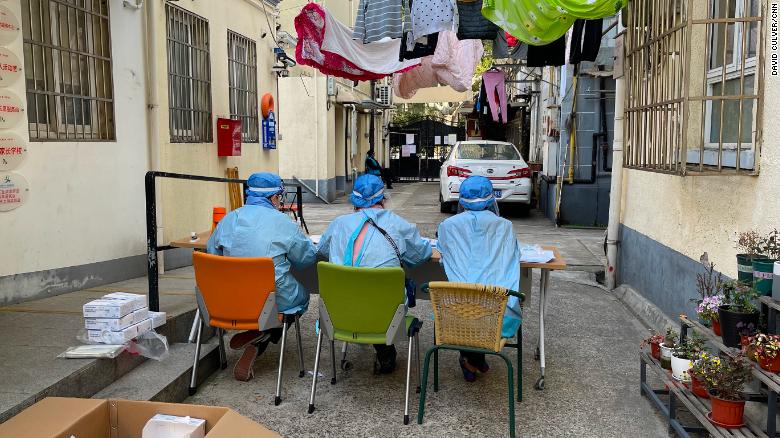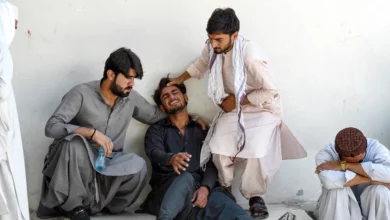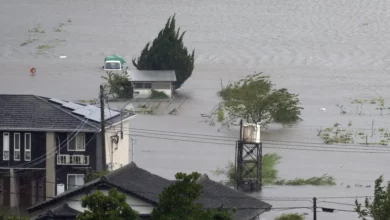
Shanghai (CNN) – The distant echo of a megaphone blares most mornings from the narrow laneway where I live in Shanghai, summoning me and my neighbors from our homes for our mandatory Covid test.
Mask on and cell phone in hand, I step outside before the volunteers in hazmat suits have time to knock. If you miss the call, they’ll keep knocking until someone answers. No one is exempt.
This massive city of 25 million people is at the center of China’s efforts to stamp out the country’s largest ever Covid outbreak. No one is allowed to leave their residential compounds, even to buy food, meaning we rely on the government or private delivery drivers stretched thin by the massive demand. That’s creating huge pressure on the system — and for many people, the restrictions are more distressing than the threat of the virus.
Outside my apartment, hazmat-suited community workers lead me and my neighbors in a socially distanced procession past our locked front gate, the only time I’m allowed out of my apartment. But they never lead us out of the gate — it’s been sealed with padlocks and bicycle locks for more than three weeks.
As we walk to a table covered with a blue tent where medics are waiting to administer the test, I feel a surge of emotions — relief at being allowed out into the fresh air and spring sunshine, and anxiety — what if I test positive? I worry about being sent to Shanghai’s spartan quarantine system for days or weeks. Images of the facilities suggest I could face cramped, unsanitary conditions with overflowing trashcans, no running water and dirty communal toilets.
But I’m more uneasy about what may happen to Chairman, my rescue dog.
What happens to your pet if you test positive remains an unsettling gray area with no clear solution. Horror stories circulate online about pets being left behind and one was recently killed with a shovel by a person in a hazmat suit.
If I’m taken to quarantine, I’m hopeful one of the local vets or community groups might be allowed to take care of my dog. I’ve packed a small bag of Chairman’s essentials that sits by the door in case someone is able to take him in if I’m sent away.
But that may be unlikely. Aside from essential workers, the entire city is like me, locked down and locked in.
Scrambling for extra food
In late March, before the city was ordered to stay home, panicked buyers left grocery store shelves empty.
Now, desperation has set in.
Videos show people screaming at community workers, pleading with them for food, saying they’re starving. Others show crowds at a quarantine food distribution site fighting over a small delivery of vegetables.
In my community, the government delivers food once every few days. Deliveries range from a box of vegetables and eggs, to a vacuum-sealed piece of pork or some Traditional Chinese Medicine (TCM). The handouts alone are not enough to feed one person, let alone an entire family, beyond a day or so.
I ration my food and make the most of what arrives in the box and any extra food my community has been able to source. Lately, most of my meals have been a combination of eggs and carrots — you have to get creative.
Many communities have set up group chats with their neighbors on Chinese social media app WeChat. Occasionally there are offers for group food buys, but options are limited. Shops are shuttered, delivery drivers locked down, supply chains disrupted.
One of my neighbors writes in the chat group, “What should I do if I have no food?” The community liaison writes back, “There is no group purchase — vegetables are in short supply now.”
I spend much of my lockdown days trying to place multiple grocery orders, hoping one will arrive. Last week, I was woken by a call just after midnight — one of my orders had actually shown up.
I urgently tried to get a hold of our community liaison officers to help retrieve it, but after a long day’s work they were asleep. So, I had to leave the groceries sitting in a box on the street outside the compound until 6 a.m., hoping that nothing was taken or spoiled by the time I could get it. Thankfully, it was still there in the morning.
Some of us have resorted to creating contact-less “drop spots,” where we swap food to vary our diets.
For example, after walking back home from a community Covid test, one of my neighbors sent me a message: She had left a block of cheese in the shaded spot above her bicycle. When I headed out to my Covid test later, I took her cheese and replaced it with two oranges. She then collected the fruit when she was allowed out for her next Covid test.
Authorities seem to be hearing the complaints. Over the weekend, Shanghai vice mayor Zong Ming choked up at a news conference, apologizing to the city’s residents for failing to meet expectations. And on Monday, authorities promised to begin easing lockdowns in some areas.
Anger and an uncertain future
From Wuhan onward, I’ve covered every aspect of this outbreak in China. The early mishandling and alleged cover-up of the initial spread seemed to have been forgotten by the public as the central government forged ahead with its “zero-Covid” policy.
For two years, China largely succeeded in keep the virus out, by closing borders and introducing a seemingly sophisticated contact tracing system that uses smartphone technology to track us and our potential exposure to the virus.
Officials have perfected mass testing with capabilities to quickly process cities of populations in the tens of millions. And they’ve relied mostly on targeted, snap lockdowns — closing down a neighborhood, office or even a shopping mall with a confirmed case or close contact inside — trying to avoid shutting down entire cities so as to minimize social and economic damage.
In recent months, entire cities have gone into lockdown — including Xi’an, Tianjin, and Shenzhen — but nothing on the scale of Shanghai, where the adrenaline and communal spirit to contain the virus has been replaced by fatigue, frustration and despair.
From the confines of my 600-square foot apartment, I ask myself, is this really happening? In Shanghai, of all places?
A modern city of highrises and restaurants, Shanghai once rivaled cosmopolitan centers like Paris and New York. Now millions of residents are scrambling for basic necessities from the confines of their homes.
That’s not to say life in Shanghai won’t resume as it was, but the actions — or inaction — of the past several weeks, coupled with the constant uncertainty over the past two years about what harsh restrictions could suddenly surface in the name of Covid prevention, leaves many feeling increasingly disconnected to this city and each other.
On Monday, the US State Department ordered non-essential consular personnel and their families to leave the city, citing the surge in Covid-19 cases and the impact of restrictions imposed to contain it.
Most expats I know have either already left or are determined to get out. The reason? “This is not sustainable” is a common refrain.
Mentally. Emotionally. Physically. It’s not.




